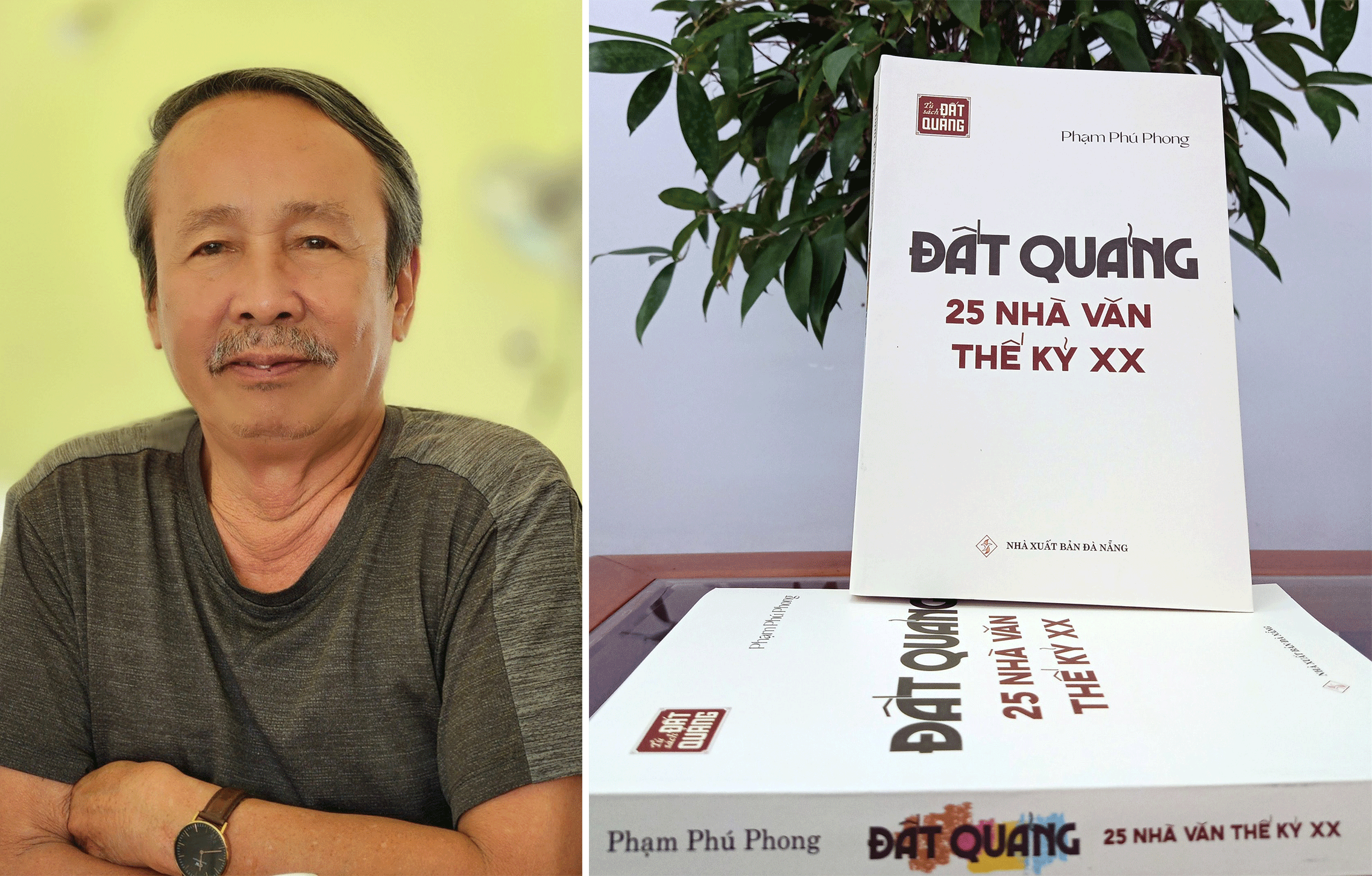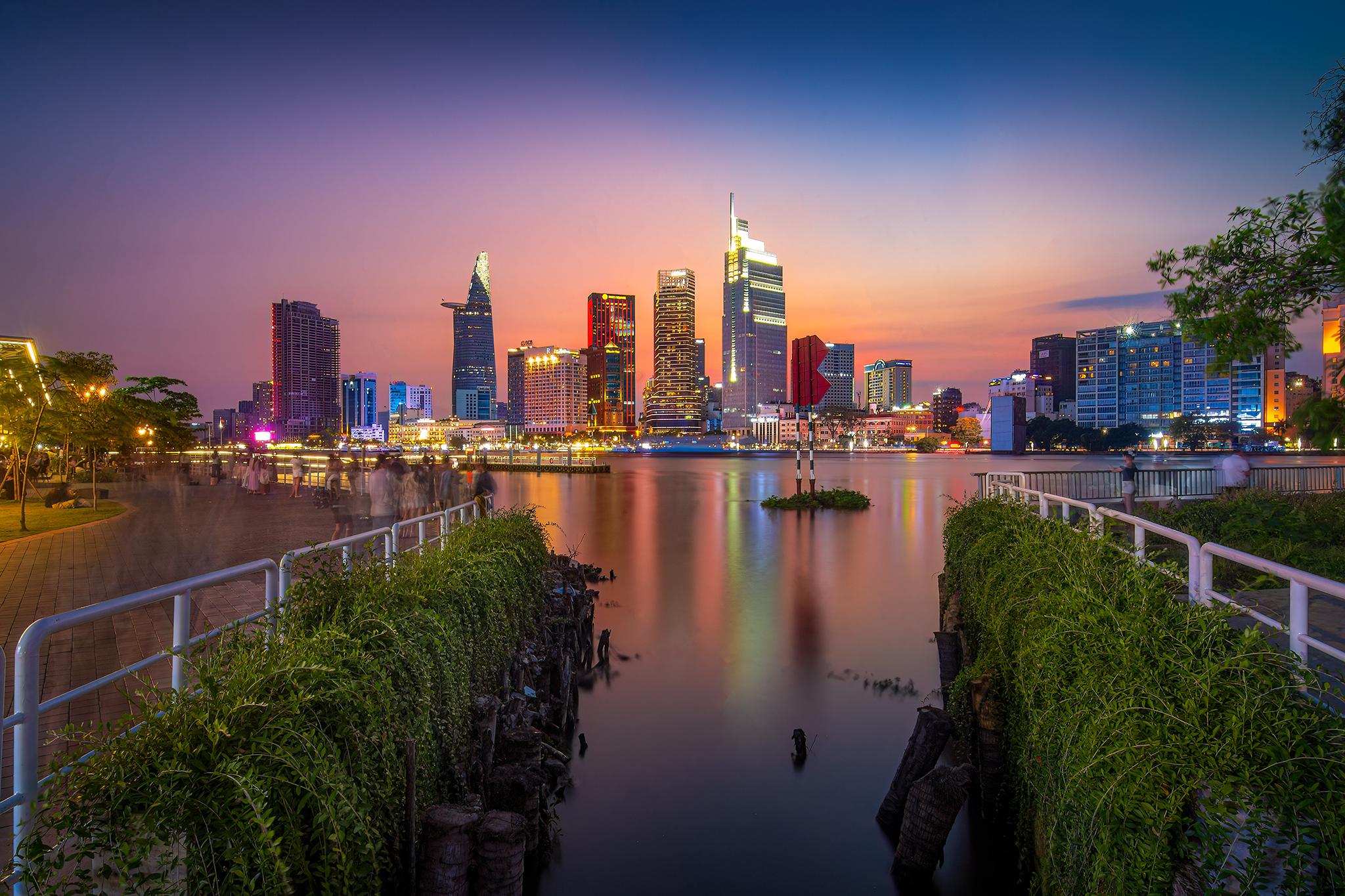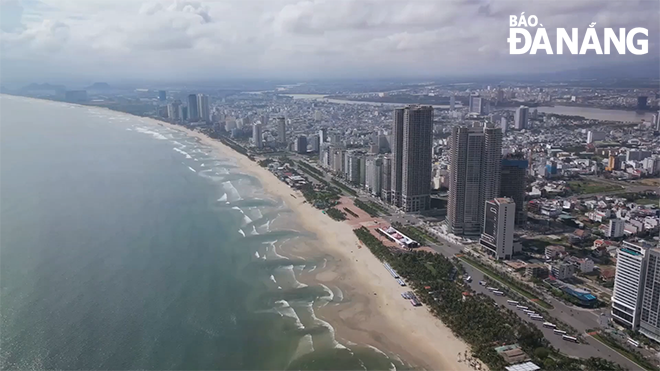A gathering place for gifted writers
For decades, literary tradition in Quang region has stood out with its powerful, sharp, and concise style which is always deeply intertwined with a profound love for the homeland and the nation. From the works of Phan Khoi, Tu Nhat, Huynh Ly, Nguyen Van Xuan, Bui Giang, Nguyen Ngoc, Thu Bon, Chu Cam Phong, Luu Quang Vu..., to the extensive research of writer Pham Phu Phong—author of Nhung chan troi xanh tham (Endless Blue Horizons, Writers Association Publishing House, 2018) and Dat Quang - 25 Writers of the 20th Century (Da Nang Publishing House, 2022) and hundreds of other research works have contributed to portraying the rich and continuous picture of Quang literature throughout. This is a literary landscape shaped by brilliant minds, imbued with a strong spirit of resistance, social critique, and intellectual depth.
 |
| Author Pham Phu Phong (left) and his book Dat Quang - 25 Writers of the 20th Century offer a detailed portrayal of the personalities and writing styles of literary figures in Quang region. Photo: ANH QUAN |
Da Nang Weekend had the opportunity to sit down with writer Pham Phu Phong to explore how the works of these gifted authors transcend personal expression, serving as a profound reflection of the soul, identity, and character of a land rich in cultural and historical traditions.
* In your opinion, what are the most distinctive traits in the works of writers in Quang region?
- Writers from Quang region always wield their pens with unwavering conviction—at times a bit defiant—writing what they truly believe. They do not merely depict reality with accuracy but also express their inner perceptions with honesty. People often recall the saying, “Dat Quang Nam chua mua da tham...” (Quang Nam’s land absorbs even before the rain falls). It was only in recent years, as I approached the age of reflection, that I fully grasped its meaning. That phrase represents the sharp instinct of people in Quang region: a keen sensitivity to the new, the beautiful, and the profound. It is an awareness that drives thought and action, always looking ahead, toward the future, bringing forth remarkable innovations across generations.
For instance, the early 20th-century patriotic movements led by Thai Phien, Tran Cao Van, Phan Chau Trinh, Huynh Thuc Khang, and Tran Quy Cap, or the earlier reform proposals of Phạm Phu Thu, all reflect this pioneering spirit. Yet, among them, Phan Khoi stands out as the one widely recognized for his success, becoming a trailblazer in both poetry and literary criticism.
* Among the 25 writers from Quang region of the 20th century that you studied, who best embodies the Quang spirit in their work? Is there a distinction between how this spirit manifests in prose versus poetry?
- In my opinion, Bui Giang and Thu Bon in poetry; Nguyen Van Xuan, Phan Du, and Nguyen Ngoc in prose; Le Dinh Ky and Nguyen Van Hanh in literary theory and criticism; or even Hoang Tuy in mathematics—all exemplify this characteristic spirit. Additionally, Vu Gia’s eight research projects on the Tu luc van doan further showcase this intellectual legacy.
Phan Khoi, in particular, most vividly embodies the Quang spirit in both poetry and literary criticism. The cultural character of Quang people is to say the opposite. They “like to argue” but they must have a scientific basis to argue! Poetry, for them, is an outpouring of emotion, yet their language is full of Quang style thinking. In prose, this spirit manifests in a deep exploration of the hidden layers of life, with a narrative and descriptive style that seeks to expose the raw truth.
In literary criticism, one must not only possess a deep understanding of Vietnamese culture and the rich cultural layers of Quang region but also have the courage to discover and propose new ideas based on rigorous logic and scholarly depth. The cultural heritage of Quang region has been cultivated over generations, shaping a towering legacy. Writers with a distinctive, intrinsic Quang spirit are truly representative of the region’s culture, and worthy of being recognized as the eminent literary figures of Quang region.
* Many people have observed that Quang writers and scholars tend to adopt a writing style that is both simple and powerful, accessible yet profound. Do you agree with this assessment?
- Absolutely. Most Quang writers feel an urgent need to engage with life, compelled to speak the truth with an aesthetic sensibility and a deep moral conscience. Their writing radiates humanistic values—authentic, unembellished, and free from literary pretension.
* Quang Nam - Da Nang is a land rich in cultural and historical heritage. In your opinion, how does this influence the tone, material, and style of its writers?
- The people of Quang region are known for their directness, sometimes to the point of lacking subtlety. Quang culture is deeply pragmatic, which can occasionally make it seem harsh. As a result, Quang literature is unembellished—it does not indulge in ornamental flourishes but instead stems from the raw realities of life, as fundamental as food, clothing, and the air we breathe. To capture the essence of Quảng literature, one might recall Trung Trung Dinh’s remarks about Thu Bon: “He does not flatter life, nor does he caress his verses. He does not deliberately seek novelty in words.”
Elsewhere, things may be quite the opposite! I do not mean to suggest that this contrast is negative—after all, life thrives on subtlety, ease, and pleasantness. However, this directness is an inherent trait of the Quang people, a defining element of Quang culture. In many specific instances, it can be seen as a drawback, but what else can one do? It is simply part of who we are.
* Throughout your journey of writing and researching Quang literature, what has left the deepest impression on you?
- It is the chance to revisit the pages of books, to explore the soul-houses steeped in the rich and passionate essence of our homeland. For a writer, the homeland is the very core, a sacred ground that exerts an almost mystical pull—an unrelenting force that compels the pen to move. The homeland is like an eternal river, ceaselessly flowing, carrying with it the fertile alluvium that nourishes and shapes us into who we are. My life is deeply indebted to two lands, each embraced by a river that flows endlessly, without banks or boundaries: the Perfume River and Thu Bon River.
I have contributed to more than 50 collaborative publications and authored 15 individual works. Regarding Quảng Nam, my notable works include “About a literary region” (co-authored, 1983), “Quang Nam Journalism in the 20th Century” (co-written with Phan Quoc Hai, 2013), and “Dat Quang - 25 writers of the 20th century” (2024). As for Hue, my second homeland—the place that has nurtured me since 1968—I have compiled “Portrait of Binh Tri Thien literature” (editor, 1989) and “100 national language literatures of Hue (1920-2020) - a perspective” (editor-in-chief, 2024). The Quang Nam Provincial People’s Committee has provided support and encouragement for me to write “Quang Nam culture - seen from a model of a cultured person”, yet, for some reason, it has remained an unfinished endeavor for quite some time.
* When compiling Dat Quang - 25 writers of the 20th century, what criteria did you use to select these 25 prominent authors?
- I based my selection on the defining cultural attributes of Quang Nam. Typically, people look for writers who were born and raised in Quang Nam and wrote about the region. Another approach is to include authors of Quang origin who wrote elsewhere. A third category consists of writers from other regions who came to Quang Nam, lived, fought, and wrote about the land.
While I considered these factors to some extent, what mattered most to me was the "Quang spirit" embedded in their writing and actions—not merely in their personal background. That is why, in Dat Quang - 25 writers of the 20th century, I included authors like Thach Lam and Luu Quang Vu.
Because in these authors, I found a lifelong yearning for their ancestral homeland—something even greater than nostalgia: a profound cultural essence and an innate drive for renewal. They were revolutionaries in literature and the arts, individuals who took real action both in their creative thinking and in life itself. Even someone as gentle and romantic as Thạch Lam embodied this spirit. As Gamzatov aptly stated, "A person can be separated from their homeland, but their homeland can never be separated from them."
* Do you have difficulty in analyzing the differences in each writer's style while still ensuring the connection of Quang's personality?
- There are some difficulties in finding a way into the spiritual world of the authors, it wasn’t overly difficult to attune myself to their literary voices and inner worlds—because I am a person from Quang region. Though I have lived away from home for many years, I have not been estranged from my roots. I have remained untouched by the temptations, influences, and even the pressures of life, from wartime to the present.
* As someone from Quang region yourself, do you think the Quang character has influenced your working style?
I see myself as far beneath the authors I have studied, but from time to time, I do manage to write something worthwhile—though my words are often sharp, and not always pleasant to read. Some may find them difficult, even uncomfortable. But that’s just how it is! There’s no changing it! The flesh and blood, the essence, the spirit, the breath that shape my literary voice all come from the soil and fields of Quang region. I believe this is a defining trait of the Quang Nam–Da Nang people, carried through generations. It is this very nature that has forged a spirit of renewal, a willingness to challenge conventions, and a drive for social critique. When you tell the truth and hit the mark, no one can argue—though they may not always like what they hear.
* Thank you!
Reporting by TIEU YEN – Translating by HONG VAN








